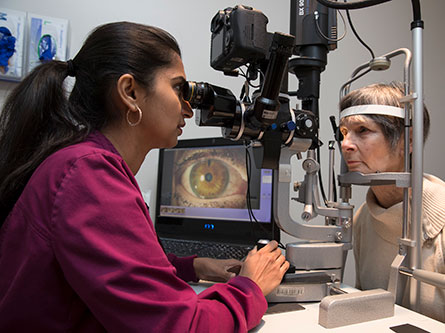Macular degeneration affects many Americans. But living a healthy life can help slow progression and regular eye exams can help catch it early.
Macular degeneration is the leading cause of vision loss in the U.S. for adults over 60, according to the American Macular Degeneration Foundation. About 1 in 10 Americans over age 50 are affected by this condition.
If you notice changes in your vision or vision loss, you should get an eye exam. Most people over age 50 should have eye exams every year.
What is macular degeneration or age-related macular degeneration?
Macular degeneration, also known as age-related macular degeneration, or AMD, is a disease that causes damage to the central part of the retina.
Some people have an accumulation of drusen – or a deposit of lipids and proteins – underneath the retina. That causes swelling of the retina. The retina starts to bend, which affects the central vision.
When the disease becomes more advanced, it can lead to abnormal blood vessels that can enter the eye. This can cause more severe vision loss.
Learn about eye conditions and treatments in our health library
What's the difference between dry and wet macular degeneration?
Most people have the dry form of macular degeneration. It's the most common and early form. The dry form can convert to the wet form in about 10-15% of people.
The dry form is an accumulation of drusen under the retina. When specialists look in the eye, they can see these small yellow deposits on the retina. Through testing, scans and photos, specialists can look at the layers of the retina and grade the level of degeneration.
Wet macular degeneration is the most advanced form. With this, there can be a break in the retina and abnormal blood vessels can form. That can cause more severe vision loss because blood is entering the eye. Vision can quickly decline.
What are the symptoms of macular degeneration?
Some early signs can be loss of central vision. A person may notice that when they're reading, words may be missing in the middle. Or when they're driving, the central part of their vision is obscure or gray.
For wet macular degeneration (the most advanced form), a person may notice that when they're looking at a line, it may look bent or distorted. This is a more sudden and severe loss of central vision.
If you or someone you know notice any of these changes in the central vision or vision loss, make an appointment with an eye doctor right away. Some people can go years with the milder (dry) form without noticing a major change in vision. However, if there is a progression to wet AMD, there will be a greater change.
How is macular degeneration diagnosed?
Eye exams usually have two parts. During the first part, eye care providers look at the refractive error to determine the best correctable vision for the patient. This is finding out the prescription for glasses.
The second part of the exam is looking at the health of the eye. Providers look from the front to the back of the eye, looking for conditions that may cause vison loss.
Some common conditions they look for include cataracts, glaucoma, retinal holes or tears and macular degeneration. Many of these conditions are more common in aging eyes.
Explore our Eye Center to schedule an appointment
What helps prevent or slow macular degeneration?
There's no way to prevent macular degeneration. But these things can help slow its progression.
It's important to live a healthy lifestyle by eating well, not smoking and exercising regularly.
See how our classes can help you quit tobacco
Some recommended foods include those with lutein, Omegas 3s, and antioxidant properties. This means eating more dark leafy greens, fish and nuts. Experts may also recommend nutritional supplements.
Learn about healthy eating from our Good Food Is Good Medicine blog
Ultimately, the best way to help prevent macular degeneration is to catch it early with regular eye exams.
How is macular degeneration treated?
If the dry form is found – depending what level it is – experts recommend multivitamins called AREDS vitamins. These are for moderate to severe dry macular degeneration.
If it's the wet form, there's an injection that's inserted into the eye by a retina specialist. This helps regress the blood. Visual outcome from this treatment is fairly good.
Learn about an experimental treatment for wet AMD at UC Davis Eye Center
Anytime you or someone you know has any sign of vision loss, see an eye specialist right away.
This blog was medically reviewed by UC Davis Health optometrist Marcia Nearing.




